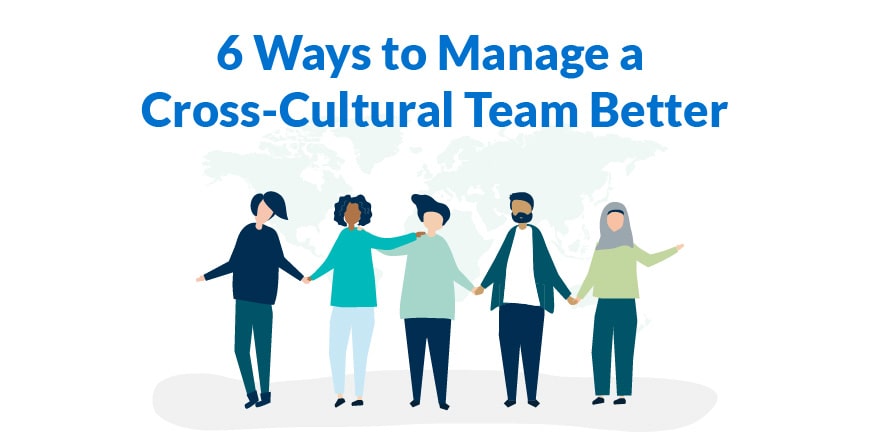
Types of Apprenticeship Training
31/10/2023
6 Tips to Onboard a Great Leader
18/11/2023In a survey of over 90 countries, it was observed that 89% of white-collar workers complete projects as members of global virtual teams where team members from different regions of the world must collaborate and work together. Now, imagine the same multicultural team is seated in your office, looking for your guidance to help manage it better.
In this article, we will see how to, but before we do, let’s look at why multicultural teams need a certain management level.
Raising a Toast
It is not unusual for a native speaker or someone highly fluent to ‘raise a toast’ to someone. If it were a meeting, they would raise a glass of wine to do so. It is okay if the gentleman making the toast proceeds immediately to raise the glass of wine as he is speaking.
The Flipside
But what if there is a delay or the person who initiated the toast is unable to find a glass of wine? A non-native speaker or one who is not very fluent in English would be staring down at the bread toast in his plate and wondering if he is responsible for doing something with it.
Probably raise the toast in the air. And how exactly would the person receiving this toast (pun intended) react? There are no limits to imagination here.
Immediate Perk of a Cross-Cultural Team
As you can imagine, working with a cross-cultural team at the office is equal parts fun and confusion. A lot of fun, thanks to the diversity that exists, which prompts people to explore new ideas, thoughts, and traditions. And evidently, the confusion itself sometimes could lead to more fun in the office!
Other Perks of a Cross-Cultural Team
A study conducted in California, USA, in partnership with a Canadian company, in the end of 2017, showed that a cultural training program can help boost innovative work behavior and resilience. So, apart from the fun factor we discussed earlier, a cross-cultural team is also about:
Empathy, understanding, and respect
Working in a cross-cultural team makes you stop and think at every juncture if there could be any ambiguity in anything you have communicated. You are always trying to simplify the way you communicate, and when someone else is talking, you stop to give time to understand what the other person has said (through active listening).
You also make room for another’s ideology and tradition, giving them an ear when they need to be heard. This eventually makes you more empathetic and understanding.
Multilingual and multicultural teams are an asset
When communicating with your customers in a new location, it will serve you well to have someone in the team who speaks the local language. This is because they will understand the customer’s needs and frustrations better than anyone else in your team. They can also help resolve certain issues that are hyper-cultural much faster than anyone else can, not to mention the fact that such language and cultural learning can spread to others in the team, too.
Solve problems faster
According to studies, problem-solving is much faster and perhaps even more creative in multicultural teams and people with varying cognitive skills and dimensions.
There are cultural references that can prove useful in solving many problems, and when given a problem, each person will first look for inspiration in their own culture. Workplace diversity is something that new recruits also actively look for, and it can attract a diverse and highly skilled talent pool.
The benefits of a cross-cultural team in an office are not just restricted to the four we have cited, and it is quite possible we may have missed a few. If you can think of anything else, let us know in the comments below.
Challenges in a Cross-Cultural Team and How to Overcome Them
Despite these benefits, there are some uphill challenges in a cross-cultural team. Working against the challenges that crop up requires a lot of fortitude and goodwil,l though, to begin with. But that may not be enough. Here are 5 common challenges in a cross-cultural team and how you can overcome them.
Challenge 1: We communicate differently
In several cultures around the world, even those that speak a version of English, a word might have a different intended meaning there than that to a native speaker. There could be a difference in word usage even with native speakers across countries.
In the US, the word ‘lift’ could mean to offer a ride to someone or to physically lift an object. In the UK, this could also have the same meaning as an ‘elevator’. The word ‘elevator’ is not used in the UK.
Solution. 1: Use an unambiguous way and context
Try and use the words in an unambiguous way by also explaining in detail and putting it in context. For instance, if you are an Englishman in New York (like the famous song by Sting goes), you can start by using the word elevator.
If you still can’t give up the word “lift”, put it in context, such as “Would you be taking the lift or the stairs?” rather than just saying “Would you be taking the lift?”, which could also mean using a known person’s cab to commute.
Challenge 2: We have opposite attitudes towards conflict
In certain cultures, people talk louder than in others. This is especially the case in Italian and even in many Asian cultures, where it is associated with enthusiasm.
On the other hand, in an American or British office setting, this would be suspected as a possible conflict. And what is the case when there is an actual conflict?
In the US, when there is a conflict, employees are urged to talk things out in private or in the presence of a mediator and get it sorted. However, in a few East Asian countries, such conflict by way of argument is discouraged. They prefer a more written way of settling a conflict.
Solution. 2: Identify what works best, and make a note
Often in a conflict, there is little time to find a solution. But even if you are pressed for time, make good use of time, take things slow, ask for time, and consult with colleagues who come from a similar background as the person you conflict with as to what can be done.
If there are any trustworthy online resources or a consulting psychologist in the office, it would be best to consult them also.
Make a note of what worked for you the first time, and the next time you are in a conflict, make sure you go back to it. As far as perceptions towards conflict are concerned, these will take time to change, and it is best if you cultivate a sense of empathy and understanding over time at the workplace.
Challenge 3: We have differing attitudes towards work
An employee’s attitude toward work varies from culture to culture, based on the rewards offered, the priority that they perceive for the given task (how much time they should take to complete the task) from their experience at work, and even differences in perception of how the task is communicated to them.
The relationship building on a task also varies. For instance, according to some studies, Asians and Hispanics tend to view relationship building as important right from the start of a project, whereas Europeans and Americans do not focus as much on relationship building.
Solution. 3: Set the right expectations, the right way
When you communicate with someone in a multicultural team, make sure the communication is straightforward and contextual. Make sure you also state a proper turnaround time in addition to just saying that the task is high priority or low priority.
When you offer rewards for completion of work or as a way of recognizing efforts, make sure that they will be valued by everyone in your team. Consult with your team members if you need to.
Challenge 4: We differ in decision-making styles
In the US, generally, the power of decision-making is delegated to a subordinate whom the person trusts. In the Latin American countries, a great degree of ownership is exhibited by individuals concerned.
So, they tend to make the decisions by themselves. According to a study, in a country like India, the people who work for public and private sector companies differ in the way they operate. The study says that in public enterprises, it is more common for managers to consider others’ opinions before deciding, whereas in private companies often other factors such as economic viability and availability of resources also influence decision-making strongly.
Solution. 4: Make a bold decision grounded in data
The modern workspace is different than how it used to be. And the major difference is data. Today’s executives and team members are equipped with data.
No matter who makes the decision, as a person, the only thing you need to be worried about is whether it is consistent with data. If data gives a thumbs-up and you are confident about its accuracy, feel free to challenge what is put in front of you in a very tactful manner. Be aware of the challenges and who you are speaking with, so you can manage the scenario accordingly.
Challenge 5: We have different views on disclosure
Disclosing personal information or the reason for a conflict or a disagreement may be okay in certain cultures but may not be when you work in a multicultural team, as different cultures may view such information disclosure differently, depending on the nature of the information, the immediacy of the information and the action it is inviting.
Solution. 5: Disclosure of information must happen only when it is needed
Ensure that any information you wish to disclose regarding a conflict or disagreement happens within a very small group and in the presence of a person who handles such disputes in the company.
It might damage the working style of your multicultural team if you disclose information when you aren’t supposed to. A regional and culture-agnostic solution would be to disclose information only when needed and very rarely.
Challenge 6: We have different ideological perspectives
People in the US may be driven by a different set of views and ideologies as opposed to the people in the Middle East or further East in India. They may hold a different set of beliefs dearer to their hearts, especially those that transcend material happiness. In Eastern culture, the pursuit of a better understanding of the self itself might take more prominence.
Solution. 6: Be mindful of differences in tradition
One’s tradition is one’s own. We must be mindful of how different people experience the same event. For instance, in India, most of the people who are Hindu worship food and consider the process of consuming food as sacred.
This is not to say that food wastage does not happen in India. But if you have a teammate who happens to be Indian, you should be more mindful when you have debates about wasting food or doing something that can lead to the wastage of food. Ideally, you must work towards a solution that is beneficial to both of you and avoid arguments that may lead to conflicts.
Closing words
We hope we addressed most of the challenges that you will face in the workplace, and we hope that the solutions will help you tackle most of them. As always, these suggestions are not written in stone. Even that phrase ‘written in stone’ would have different connotations for different people in a multicultural team. We hope you have a great time building that multicultural team of yours and are unfazed by the challenges that lie ahead on your path.
Contact Us For Business Enquiry

Rajkumar Shanmugam
Rajkumar Shanmugam is the Head of HR at ALP Consulting, bringing over 19 years of comprehensive HR leadership experience across India and international markets. His expertise spans talent acquisition, employee relations, performance management, compliance, and HR transformation. Rajkumar has a proven track record of driving people-centric initiatives, enhancing workplace culture, and aligning HR strategy with business goals. With extensive experience in US staffing operations and global mobility, he continues to lead organizational excellence through innovation and employee engagement.




